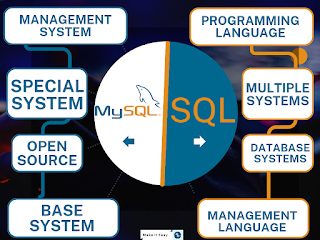sql vs mysql:
SQL is the language used to interact with databases, while MySQL is a database management system that uses SQL as a query language.
What is mysql vs sql:
It is not possible to compare a standard language and a management system as they serve different purposes.
SQL (Structured Query Language):
SQL is a standardized programming language used to manage and manipulate relational databases.
It provides a uniform way to interact with databases, allowing users to perform various operations like querying data, updating records, creating and modifying databases and tables, and defining relationships between tables.
SQL is a language used across different database management systems (DBMS) such as.
- MySQL
- PostgreSQL
- Oracle
- SQL Server
MySQL:
MySQL, on the other hand, is a specific relational database management system (RDBMS) that utilizes SQL as its query language.
It is an open-source, popular, and widely-used database system known for its reliability, scalability, and ease of use.
MySQL implements SQL commands and functionalities to store, retrieve, manage, and manipulate data within databases.
It's commonly used in web applications for its performance and compatibility.
difference between mysql sql The main difference lies in the structure, function and purpose.
sql server vs mysql:
SQL Server MySQL have differences in several aspects, which I will mention now.
1:Developing company
- SQL Server:Developed by Microsoft Corporation.
- MySQL: Developed by Oracle Corporation.
2:Type
- SQL Server:It is a proprietary database management system (RDBMS) available from Microsoft.
- MySQL:It is an open source database management system that uses SQL as a query language.
3:License
- SQL Server: Requires a commercial license for most editions, but there is a free version known as SQL Server Express Edition with limitations on database size and resource usage.
- MySQL: Open source, offering different versions with different licensing options, including commercial support.
4:Integration and compatibility
- SQL Server: Integrates well with other Microsoft products and technologies, and provides seamless compatibility with Windows environments.
- MySQL: It runs on various operating systems and is widely used in open source and web environments.
5:Features and Functions
- SQL Server:Provides a wide range of features such as advanced analytics, business intelligence, and enterprise tools.
- MySQL:Known for its reliability, scalability, and ease of use, it is commonly used in web applications.
6:User and Support Community
- SQL Server: It has a wide community and strong official support from Microsoft.
- MySQL: It also has an active community of developers and users, with support from Oracle and the open source community.
sql server mysql difference These are the most prominent differences between them.
sql server tools:
SQL Server offers a range of tools and utilities to manage and interact with databases efficiently.
1:SQL Server Management Studio (SSMS)
- A comprehensive graphical user interface (GUI) tool used for managing SQL Server databases.
- Allows database administrators and developers to perform various tasks such as querying databases, designing and modifying database structures, managing security, and creating maintenance plans.
2:SQL Server Data Tools (SSDT)
- Integrated development environment (IDE) used for building, deploying, and managing databases.
- Supports database projects, data comparison and synchronization, and schema and data deployment.
3:SQL Server Profiler
A tool used to capture and analyze events occurring in SQL Server, assisting in performance tuning, troubleshooting, and monitoring database activity.
4:SQL Server Reporting Services (SSRS)
- A server-based reporting platform that allows the creation, management, and delivery of reports.
- Enables users to create interactive, tabular, graphical, or free-form reports from various data sources.
5:SQL Server Integration Services (SSIS)
- ETL (Extract, Transform, Load) tool used for building data integration and workflow applications.
- Enables the creation of data migration, transformation, and loading processes.
6:SQLCMD and BCP (Bulk Copy Program)
Command-line tools for running Transact-SQL statements or scripts (SQLCMD) and for importing/exporting large amounts of data (BCP).
7:Azure Data Studio
- A cross-platform database tool for data professionals working with on-premises and cloud databases.
- Provides a lightweight, modern interface for managing databases, writing queries, and developing scripts.
These tools cater to different aspects within the SQL Server system to facilitate projects and management for working with databases.
sql server data tools:
what is sql server data tools? It is an integrated development environment (IDE) that provides a set of tools for creating databases and deploying database changes.
Main features and functions:
1:Database Projects
SSDT allows developers to create and manage database projects within Visual Studio, providing a centralized environment for database development.
2:Schema Comparison
Supports schema comparison between databases or database projects, allowing users to identify and synchronize differences in schema objects.
3:Data Comparison
Enables comparison of data between databases or database projects, aiding in data synchronization and verification.
4:Database Refactoring
Facilitates the restructuring of database schemas while maintaining data integrity using refactorings like renaming, splitting tables, or moving columns.
5:Version Control Integration
Integrates with version control systems like Git, TFS (Team Foundation Server), or Azure DevOps, enabling collaborative development and tracking changes in database projects.
6:Deployment
Allows developers to deploy database changes directly from SSDT to SQL Server instances or Azure SQL databases, ensuring consistency between development and production environments.
7:T-SQL Editor
Includes a Transact-SQL editor with syntax highlighting, IntelliSense, and debugging capabilities for writing and optimizing SQL queries and stored procedures.
These tools and functions simplify database development and deployment operations.
SQL and MySQL are powerful database management tools and each has its own strengths and applications SQL, as a unified language, serves as the foundation for interacting with relational databases across various platforms and systems.
MySQL, on the other hand, is a specific implementation of an open source relational database management system that makes use of the SQL language to manipulate and manage data.
Remember Make it Easy



